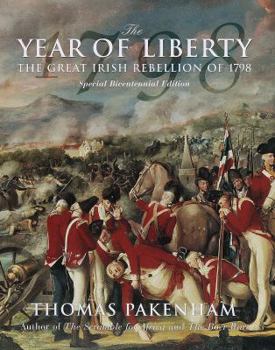The Year of Liberty: The Great Irish Rebellion of 1798
Select Format
Select Condition 
Book Overview
Now available for the first time in trade paperback: the newly revised, definitive account of the most important event in Irish history--the rebellion of 1798. This description may be from another edition of this product.
Format:Hardcover
Language:English
ISBN:0812930886
ISBN13:9780812930887
Release Date:October 1998
Publisher:Crown
Length:120 Pages
Weight:2.20 lbs.
Dimensions:12.0" x 0.8" x 9.5"
Customer Reviews
1 rating
Tragic Midpoint of the Irish Rebellions
Published by Thriftbooks.com User , 19 years ago
The 800 years of English occupation of Ireland was marked with numerous rebellions - early incidents notably included the great eruptions of the Elizabethan era, the period of tumult preceding the Cromwellian suppression, the tragic decision to back James II during the Glorious Revolution. More recently there was the uprising of 1848, the Fenian campaigns of the late 19th century, many, many parliamentary campaigns for Home Rule, and, decisively, the 1916 Easter Rebellion that finally led to independence. The 1798 rebellion was one of the most serious eruptions, all the more so because it was sponsored - however inadequately - by General Bonaparte's government, and fueled - however prematurely - by the emerging libertarian sentiment that was sweeping Europe. The public face of the rebellion was the radical aristocrat Lord Edward Fitzgerald; the underground leader was the celebrated Wolfe Tome. The immediate cause was the wholesale moral failure of the Dublin-based home-rule government ("Grattan's Parliament"), which was completely slave to narrow Protestant interests, and totally alienated from the populace at large. However, the rebellion, when it broke out, was badly organized, sporadic in nature and - after a false start of two by the British - easily suppressed. Also decisive was the fact that Bonaparte channeled most of his resources - including himself and his best divisions - away from the Irish rebellion and towards the equally disastrous Egyptian expedition. The early suppression of the rebellion was marked by acts of wanton brutality; later, under Cornwallis, order was restored with at least a semblance of consistency. The saddest thing about the rebellion was that although it became perfectly clear to Pitt and the enlightened segments of the British elite that the only solution for Ireland was emancipation of the Catholic majority, George III and the British interests became even more firmly resolved against this. Paradoxically, therefore, the consequence of the rebellion was an abolition of the local Parliament and a wholesale incorporation of Ireland into the newly-minted United Kingdom of Great Britain and Ireland; a solution that pleased neither the Protestants nor the Catholics, and simply raised the stakes of future rebellions by elevating them into even more direct acts of treason against the Crown and Parliament. Pakenham tells the story quite well; unfortunately the narrative doesn't quite match Keneally's "Great Shame"; but one compensation is Pakenham's insights into the British parliamentary scene, notably Pitt's position. (He goes on a very enjoyable tangent in describing a duel that Pitt fights). Still, the best and most readable book on the subject.





